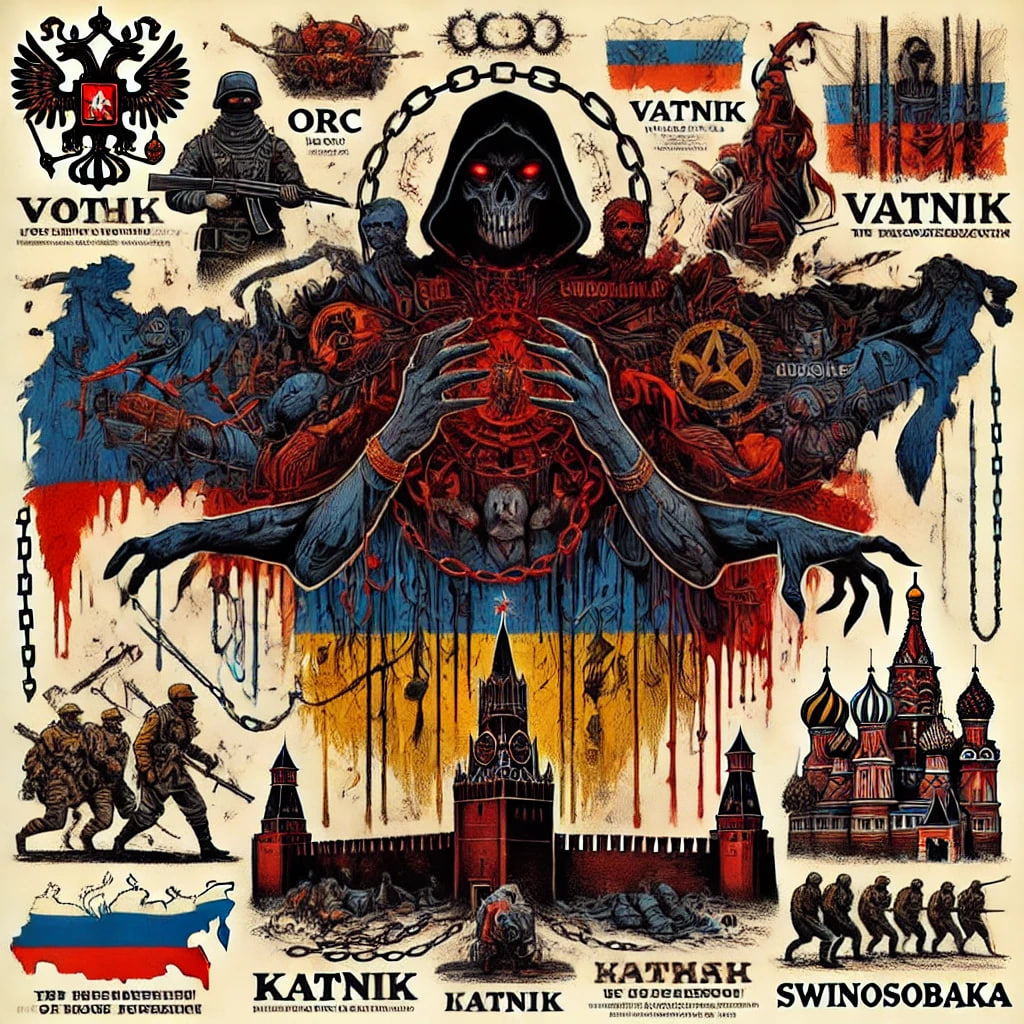**Title:** *Decoding Russia's Modern Cultural Identity through Nicknames and Insults*

Foreword:
The language we use to describe others often carries deep cultural and historical significance, shaping how we perceive groups, nations, or ideologies. In the ongoing conflict between Ukraine and Russia, the use of derogatory terms such as "Orcs," "Vatniks," "Katsaps," and "Swinosobaki" has gained prominence. These terms, far from being mere insults, offer a window into the collective Ukrainian understanding of Russia's aggression and the moral, cultural, and political implications of the war. Drawing upon both Tolkien's mythology and historical contexts, this piece explores how these labels encapsulate the perceived transformation of the Russian populace into aggressors and how they mirror the moral degradation observed by those affected by Russia’s actions. The nicknames carry layers of meaning that reflect not just anger but an attempt to conceptualize a nation that has embraced authoritarianism and violence, while also sparking debate about individual accountability within such a regime.
Hashtags:
#Ukraine #Russia #CulturalIdentity #LanguageInWar #Tolkien #RussiaUkraineWar #Vatniks #Orcs #Propaganda #HistoricalInsults #ModernConflict
Bibliography:
- Tolkien, J.R.R. The Lord of the Rings. George Allen & Unwin, 1954.
- Orwell, George. Politics and the English Language. Horizon, 1946.
- Snyder, Timothy. The Road to Unfreedom: Russia, Europe, America. Tim Duggan Books, 2018.
- Applebaum, Anne. Gulag: A History. Doubleday, 2003.
- Galeotti, Mark. We Need to Talk About Putin: Why the West Gets Him Wrong. Ebury Press, 2019.
- Volodymyr Zelenskyy’s speeches during Russia’s invasion of Ukraine (2022-2024), available at official Ukrainian government channels.
- Ukrainian National Memory Institute publications on Russian aggression and occupation policies in Ukraine.
This adaptation offers the American audience a broader context by linking modern cultural discourse with deeper historical roots and universal themes of oppression and resistance.
Ostap Ukrainets
philologist, writer
Those who use this term most likely refer to Tolkien and his orcs. This cultural phenomenon is interesting, because Tolkien's orcs were once elves who were captured and tortured until they lost their human form. They hate and fear the power that created them, Sauron, but they know no other emotions, so their aggression is directed at all living things.
This term conveys the meanings we see in modern Russia. The problem is that it seems to remove some of the blame from the Russians, as in the “Putin is the only one to blame” argument. Calling them orcs does not exhaust all the problematic aspects of relations with “ordinary Russians.” It may also seem like an excuse for their actions, but most people do not analyze this term that deeply. Therefore, it is logical to call Russians monsters, which corresponds to their crimes.
The name “pig dogs” comes from the German “Schweinhunden,” an insult associated with unclean creatures. A pig is considered a dirty animal, and a dog is considered one that eats its own excrement. The insult is ancient, but it has stuck with Russians today, even though we use it as if we invented it ourselves.
“Vatnik” is associated with the Gulag and labor camps where people worked in freezing temperatures. After 2014, it became the image of a person who values totalitarian culture above all else. Vatniks aggressively try to drag others into their mud and do not accept rational arguments.
The word “katsap” comes from the Turkic “kasap”, which means “butcher”. Its semantics became relevant again during the war. “Katsap” most aptly describes Russians who commit crimes in the occupied territories, such as the ‘Mariupol butcher’ Mizintsev.
“Moskal” meant a soldier of the Russian army. We have a rich tradition of using this word, which is associated with rudeness. In our phraseology, there is a saying “swears like a Muscovite”. Therefore, if you have to choose, Muscovites and Muscovites are the most appropriate terms.
The term “Kraut” is from the Second World War, when the name became a general designation for a German soldier. Similarly, Russians use “Nikolai” for Ukrainians. Accordingly, for Russians, “Vanka” is a way to dismissively reduce a large army to a single image, an unknown soldier who dies on Ukrainian soil.
Остап Українець
філолог, письменник
Ті, хто вживає цей термін, найімовірніше, відсилають до Толкіна та його орків. Цей культурний феномен цікавий, адже орки у Толкіна колись були ельфами, яких захопили і катували, доки вони не втратили людську подобу. Вони ненавидять і бояться сили, що їх створила, — Саурона, але не знають інших емоцій, тому їхня агресія спрямована на все живе.
Цей термін передає значення, які ми бачимо в сучасній Росії. Проблема в тому, що таким чином ніби знімається частина провини з росіян, як у аргументі «винен лише Путін». Називання орками не вичерпує всіх проблемних аспектів стосунків з «звичайними росіянами». Це також може здаватися виправданням їхніх дій, але більшість людей не аналізує цей термін так глибоко. Тому називати росіян потворами, які відповідають їхнім злочинам, — логічно.
Назва «свинособаки» походить із німецького «Schweinhunden», образа, що асоціюється з нечистими істотами. Свиня вважається брудною твариною, а собака — тим, хто їсть власні екскременти. Образа давня, але закріпилась за росіянами сьогодні, хоча ми вживаємо її так, ніби самі її вигадали.
«Ватник» асоціюється з ГУЛАГом і трудовими таборами, де люди працювали в морози. Після 2014 року це стало образом людини, якій тоталітарна культура цінніша за все інше. Ватники агресивно намагаються затягнути інших у своє багно і не сприймають раціональні аргументи.
Слово «кацап» походить від тюркського «касап», що означає «різник». Його семантика стала знову актуальною під час війни. «Кацап» найвлучніше описує росіян, які чинять злочини на окупованих територіях, як-от «маріупольський м’ясник» Мізінцев.
«Москаль» означав солдата російської армії. У нас є багата традиція вживання цього слова, що асоціюється з грубістю. У фразеології є приказка «лається як москаль». Тому, коли обирати, москалі та московити — найвдаліші терміни.
Термін «Фріц» — це з Другої світової, коли ім’я стало загальним позначенням німецького солдата. Подібно, росіяни використовують «Мыкола» для українців. Відповідно, «Ванька» для росіян — це спосіб зневажливо звести велике військо до одного образу, невідомого солдата, який гине на українській землі.